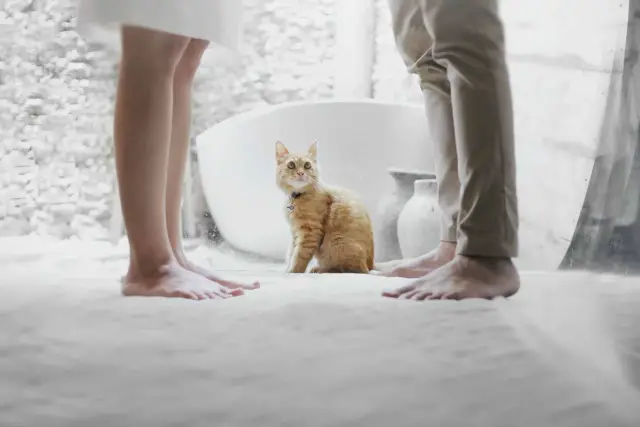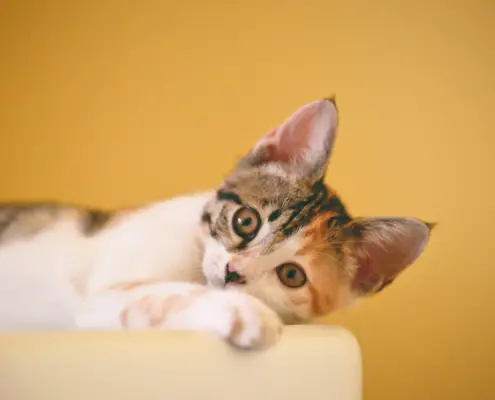
Cats are known for their independent and mysterious nature, and one aspect that often perplexes their human companions is their deep aversion to bathing. Unlike dogs, who may happily jump into a pool or frolic in a bath, cats tend to resist any form of water-related activity. But why is this the case? In this article, we delve into the intriguing world of cats and uncover the reasons behind their disdain for bathing.
The Instinctual Reasons Behind Cats’ Aversion to Water
To truly understand why cats detest bathing, it’s essential to explore their evolutionary background. Domestic cats are descendants of wild cats, and their survival instincts are deeply ingrained. In the wild, cats rely on their fur to keep warm and dry, and water poses a threat to their natural insulation. Additionally, cats are meticulous groomers, and their saliva acts as a natural cleanser. The combination of these factors leads cats to perceive water as an unnecessary and potentially dangerous intrusion.
Sensory Sensitivities in Cats and How They Contribute to Their Dislike of Bathing
Cats possess incredibly sensitive sensory systems, and this heightened sensitivity plays a significant role in their aversion to bathing. Their acute hearing and ability to perceive subtle vibrations make the sound of running water overwhelming for them. The noise and movement of water can trigger a fight-or-flight response, causing cats to become anxious and defensive. Furthermore, cats have highly developed whiskers that aid in their navigation and detecting changes in their environment. When their whiskers come into contact with water, it may cause discomfort and distress.
Negative Experiences and Conditioning That Can Make Cats Hate Bathing
Negative experiences and conditioning can significantly contribute to a cat’s aversion to bathing. If a cat has had a traumatic or stressful encounter with water in the past, they are likely to associate all water-related activities with fear and anxiety. Cats have long memories, and a single traumatic event can shape their behavior for years to come. Additionally, if a cat has been mishandled or forced into a bath, it can create a negative association with the experience, leading to a deep-rooted dislike for bathing.
Tips for Easing Your Cat Into a Bath
While it may seem challenging, there are ways to make bathing a more tolerable experience for your cat. Patience and a gradual approach are key. Start by introducing your cat to water in small increments, such as allowing them to explore a shallow basin of water at their own pace. Use positive reinforcement techniques, such as treats and praise, to create a positive association with water. Additionally, it can be helpful to acclimate your cat to the sound of running water by incorporating it into their daily routine, such as during playtime or feeding.
Alternative Bathing Methods for Cats
If your cat simply cannot tolerate traditional bathing methods, there are alternative options available. Dry shampoo, specifically formulated for cats, can be used to freshen their coat without the need for water. These products typically contain gentle cleansers that remove dirt and oils while being safe for feline use. Additionally, some cats may respond well to a damp cloth or pet wipes for spot cleaning. These methods allow you to maintain your cat’s hygiene without subjecting them to the stress of a full bath.
Understanding and Respecting Your Cat’s Boundaries
As responsible cat owners, it is crucial to understand and respect our cats’ boundaries. While bathing may be essential for their hygiene, it is essential to recognize that some cats simply cannot tolerate it. Pushing a cat beyond their comfort zone can lead to increased stress and strain on the human-animal bond. It is important to find alternative methods of maintaining their cleanliness and consult with a veterinarian or professional groomer for guidance and advice tailored to your cat’s specific needs.
Debunking Common Myths About Cats and Bathing
Throughout the years, various myths and misconceptions have emerged surrounding cats and bathing. Let’s debunk some of these common misconceptions:
- Cats are self-cleaning animals
While cats are indeed meticulous groomers, there are instances where they may require additional help in maintaining their hygiene, especially as they age or if they have medical conditions.
- All cats hate water
While many cats do dislike bathing, there are exceptions. Some cats may actually enjoy water or have no aversion to it. Each cat is an individual with unique preferences.
- Cats can clean themselves adequately without human intervention
While cats are skilled at grooming, they may need assistance in hard-to-reach areas or when dealing with specific issues such as matting or skin conditions.
Seeking Professional Help: Groomers and Veterinarians
If you find that bathing your cat is an overwhelming task or your cat’s aversion to water is causing significant distress, it may be beneficial to seek professional help. Groomers who specialize in working with cats can provide invaluable guidance and expertise in handling and bathing techniques that minimize stress. Additionally, veterinarians can offer advice on alternative methods of maintaining your cat’s hygiene or address any underlying medical conditions that may be contributing to their aversion to water.
Loving and Caring for Your Cat, Even If They Hate Bathing
While the mystery behind why cats hate bathing may never be fully unraveled, it is essential to approach the matter with understanding and compassion. Cats’ aversion to water is deeply rooted in their instincts, sensory sensitivities, and past experiences. By respecting their boundaries and finding alternative methods of maintaining their hygiene, we can ensure their well-being and strengthen the bond we share with these enigmatic creatures. Remember, loving and caring for your cat goes beyond bathing, and there are numerous ways to show them affection and care that align with their individual needs.
If you enjoyed my article, I would appreciate you sharing it with your network.

Sima Ndlebe
Sima writes for CatBuzz. He is interested in Cats, Health and Fitness, and Entrepreneurship.
Published: 30 October 2023



